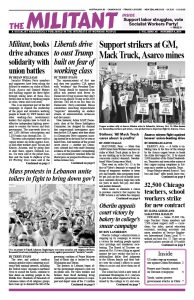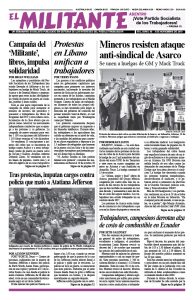LONDON — The House of Commons voted Oct. 19 to instruct Prime Minister Boris Johnson to seek another extension to the deadline for the U.K. to get out of the EU — the latest episode in a campaign by the U.K.’s propertied rulers to get around the majority vote to do so in a 2016 referendum.
While the EU considers its response, Johnson’s minority government is seeking allies to push through Parliament the withdrawal arrangements it reached with the 27 other governments in the EU, before the Oct. 31 deadline.
Johnson claimed the deal, approved at an EU summit days before, was “great” and “new.” But “there isn’t a lot of difference between what [previous Prime Minister] Theresa May had and what Boris Johnson has,” commented Stuart Rose, chairman of online supermarket Ocado and former chairman of the “Britain Stronger In Europe” campaign. Rose, other business leaders and the bulk of the capitalist dailies backed the Johnson deal — just as they had backed the rejected deal negotiated by May.
Whatever the European governments decide about an extension, the “withdrawal” agreement will apply only to the EU’s “political institutions.” EU trade, customs, security and other regulations will continue to apply to the U.K. until the end of a 14-month so-called implementation period, which could be extended for two years while officials discuss new trade and other arrangements between the U.K. and the EU.
Under the pretext of keeping trade between the border of Northern Ireland and the Republic of Ireland frictionless, May’s previous government kept the entire U.K. enmeshed in the EU.
Under Johnson’s deal the U.K. government would be able to seek its own trade deals for the British capitalists with other governments outside of Europe after the transition period. Northern Ireland would remain part of the U.K.’s customs territory but would continue to be subject to a raft of EU regulations, including its rules on sales taxes. There would be no customs check at the border between the Republic and Northern Ireland but there would be between Northern Ireland and the British mainland.
This arrangement would be subject to ratification by a vote in the Northern Ireland Assembly four years after the end of the implementation period.
“The Irish border issue should be settled by the Irish people. Britain should get out — just as the U.K. should get out of the EU — now!” commented Communist League parliamentary candidate Caroline Bellamy. “For working people, the only issue is putting ourselves in the best position to fight the bosses’ assaults on our living standards, job security, broader social conditions and the U.K.’s and its allies’ endless wars abroad.”
Labour Party leader Jeremy Corbyn condemned the arrangement, claiming it would create “a border down the Irish sea between Britain and Northern Ireland.” Democratic Unionist Party leaders claimed the deal was an “awful betrayal.” Scottish National Party leader Nicola Sturgeon complained the deal would take Scotland “out of the EU’s single market and customs union — all against our will.” She called for a new referendum on Scotland’s independence in 2020. Following the Commons sitting, a number of Members of Parliament joined thousands of middle-class protesters demonstrating outside Parliament for the U.K. to remain in the EU.
The bulk of the rest of the withdrawal agreement negotiated by May — which Johnson had said would turn the U.K. into a “vassal state” of the EU — remains intact. “This is Brexit in name only” commented Nigel Farage, leader of the Brexit Party.

